Published in Nacional number 617, 2007-09-11
POLITICAL REPORT
Tudjman family looking to oust Sanader
MIROSLAV TUDJMAN, son of the late President Franjo Tudjman, with the backing of his family and those politically like-minded, is preparing an attack against the Prime Minister and HDZ boss Ivo Sanader because they believe he is leading the party to ruin
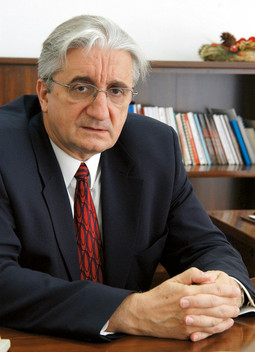 Miroslav Tudjman launched his political campaign, in which he attacks Stipe Mesic and heralds his ambitions to change the situation in the HDZ, in Australia Miroslav Tudjman, the eldest son of the first Croatian President, Franjo Tudjman, with the backing of his family and a small circle of those politically like-minded and some former intelligence people, which the press colloquially refers to as the intelligence underground, is as of recently trying to prepare a coup against HDZ president Ivo Sanader, to undermine his position within the party and, if possible, to in the future oust him from the head of that party, Nacional has learned from well-informed political sources.
Miroslav Tudjman launched his political campaign, in which he attacks Stipe Mesic and heralds his ambitions to change the situation in the HDZ, in Australia Miroslav Tudjman, the eldest son of the first Croatian President, Franjo Tudjman, with the backing of his family and a small circle of those politically like-minded and some former intelligence people, which the press colloquially refers to as the intelligence underground, is as of recently trying to prepare a coup against HDZ president Ivo Sanader, to undermine his position within the party and, if possible, to in the future oust him from the head of that party, Nacional has learned from well-informed political sources.
The makeup of the team spearheaded by Miroslav Tudjman reveals that the coup against Sanader is actually being prepared by a part of those who fell out with the HDZ which have, as a result of the maturing of the Croatian political scene, been for several years now pushed to the position of the radical right wing and to the very fringes of social influence. They are convinced that Ivo Sanader is completely destroying the HDZ, that his policies are leading the party to ruin, in particular as a result of his relations toward the Hague tribunal. A situation in which the HDZ is increasingly seen in the public as one of the two mainstream political options, that does not at all wish to consider a renewal of the former Tudjman leadership style, also by no means suits them. Miroslav Tudjman and his group believe that a respectable number of HDZ members share his sentiments, and that they could join them in their campaign, if the right circumstances where created for it. Miroslav Tudjman's new political campaign was launched in Australia.
Miroslav Tudjman was there in August to promote his new book "Time of the Perjurer". He spoke before Croatian emigrants in Sydney, Canberra, Melbourne and Geelong and expounded the arguments in his book. There is a moderate and a radical right wing emigrant community in Australia. Those well acquainted with the situation in that milieu have confirmed for Nacional that Tudjman was a guest only of the rigidly right wing emigrant clubs. Miroslav Tudjman was present at the unveiling of a bust of Franjo Tudjman in the lobby of the "Sydney" Croatian association in Punchbowl on 5 August, and promoted the book at the Croatian House in Canberra Deakin on 8 August. The next day he was at the Croatian House in Footscray, and that same day at the Cardinal Aloysius Stepinac Croatian National House in Geelong. He closed with a promotion of his book at Sydney's Punchbowl on 12 August.
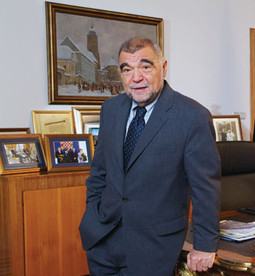 STIPE MESIC is under fire from Miroslav Tudjman because of his testimony given before the Hague tribunal and his condemnation of the policies of Franjo Tudjman Ante Juric, the president of the Croatian House in Footscray prepared a gala dinner in Tudjman's honour in the house hall, named after General Ante Gotovina. He invited eminent emigrants from across Australia. The guests arrived in Melbourne in the company of the president of the "Sydney" Croatian association Joze Jaksic, where they presented Miroslav Tudjman with gifts and thanked him for his visit. Among the dignitaries at the dinner were the top people of the Croatian Women's Society "Katarina Zrinski", the Croatian supplementary Saturday schools, the Croatian Islamic Centre, the Croatian Liberation Movement, and the leaders of the leading Croatian associations in Victoria, such as the Croatian Democratic Union, sports-football clubs and the Croatian Committee in Victoria. There were several hundred guests at the book presentation. After Tudjman's speech on the arguments in his book, the emigrants allegedly asked him in great numbers whether he would run for the post of Croatian President, and declared that they would assist him financially if he did so. Tudjman thanked them for their confidence in him, said that it was too early for that kind of decision, but that it too should be given serious consideration. In Croatia Tudjman's Australian campaign passed entirely unnoticed. It was perhaps interesting for Australian Croatians because Miroslav Tudjman earlier was unable to get an entry visa for Australia, as that country is very rigorous on the issue and asks very comprehensive and detailed questions on the engagement of the visa applicant in the wars in the area of the former Yugoslavia, in which Miroslav Tudjman played an interesting role because he was, among other things, for a time the prominent front man of the Croatian intelligence community. It is also significant that Miroslav Tudjman first sought support for his new political campaign among Croatian emigrants, just as his late father did on the eve of the break-up of the former Yugoslavia.
STIPE MESIC is under fire from Miroslav Tudjman because of his testimony given before the Hague tribunal and his condemnation of the policies of Franjo Tudjman Ante Juric, the president of the Croatian House in Footscray prepared a gala dinner in Tudjman's honour in the house hall, named after General Ante Gotovina. He invited eminent emigrants from across Australia. The guests arrived in Melbourne in the company of the president of the "Sydney" Croatian association Joze Jaksic, where they presented Miroslav Tudjman with gifts and thanked him for his visit. Among the dignitaries at the dinner were the top people of the Croatian Women's Society "Katarina Zrinski", the Croatian supplementary Saturday schools, the Croatian Islamic Centre, the Croatian Liberation Movement, and the leaders of the leading Croatian associations in Victoria, such as the Croatian Democratic Union, sports-football clubs and the Croatian Committee in Victoria. There were several hundred guests at the book presentation. After Tudjman's speech on the arguments in his book, the emigrants allegedly asked him in great numbers whether he would run for the post of Croatian President, and declared that they would assist him financially if he did so. Tudjman thanked them for their confidence in him, said that it was too early for that kind of decision, but that it too should be given serious consideration. In Croatia Tudjman's Australian campaign passed entirely unnoticed. It was perhaps interesting for Australian Croatians because Miroslav Tudjman earlier was unable to get an entry visa for Australia, as that country is very rigorous on the issue and asks very comprehensive and detailed questions on the engagement of the visa applicant in the wars in the area of the former Yugoslavia, in which Miroslav Tudjman played an interesting role because he was, among other things, for a time the prominent front man of the Croatian intelligence community. It is also significant that Miroslav Tudjman first sought support for his new political campaign among Croatian emigrants, just as his late father did on the eve of the break-up of the former Yugoslavia.
All of this reveals that the promotional campaign for the book, and the moment of its publication, were by all accounts timed so that Miroslav Tudjman could win some media attention coming into the parliamentary election campaign for his own political promotion and squaring of accounts with his political opponents.
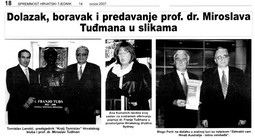 THE SPREMNOST WEEKLY ran a photo-report of Miroslav Tudjman's August tour of Australia, where he met with the heads of Croatian clubs His book "Time of the Perjurer" does not reveal anything new related to Tudjman's political options, which have pushed him to the margins of politics. In the book he, above all, sharply attacks President Stipe Mesic and his testimony given before the Hague tribunal. The criticism of Stipe Mesic in the book develops subtly in the presentation of Tudjman's political platform, but also in the defence of Franjo Tudjman's political legacy and his system of governing, which had led Croatia in the late 1990s to the brink of international isolation.
THE SPREMNOST WEEKLY ran a photo-report of Miroslav Tudjman's August tour of Australia, where he met with the heads of Croatian clubs His book "Time of the Perjurer" does not reveal anything new related to Tudjman's political options, which have pushed him to the margins of politics. In the book he, above all, sharply attacks President Stipe Mesic and his testimony given before the Hague tribunal. The criticism of Stipe Mesic in the book develops subtly in the presentation of Tudjman's political platform, but also in the defence of Franjo Tudjman's political legacy and his system of governing, which had led Croatia in the late 1990s to the brink of international isolation.
In the introduction to the book, however, Miroslav Tudjman states that he wrote it because he was unhappy with the HDZ attitude towards Franjo Tudjman and his political legacy. The criticism of the HDZ is not as straightforward as the criticism of Stipe Mesic, it is mentioned only once in the book, but it is formulated in a way that shows that Tudjman still hopes that the situation in the HDZ might change in the future making them politically acceptable for him and his sympathisers. Insofar this criticism of Tudjman's indirectly confirms that Miroslav Tudjman and his group have ambitions to influence a change of the situation in the HDZ.
Tudjman's criticism of the HDZ is summed up in the part of the book in which he describes why he decided to write it, where it reads: "I certainly cannot disregard emotional and family reasons. My obligation towards my father and the man who, deceased, is accused in the Hague, which is in itself a legal precedent, whom his political opposition crucifies with lies and declares diabolical in complete disregard of veracity and of good taste; while his own party has not renounced him, but is preparing to defend him only in some fairer weather..."
In the book Tudjman did not further explain how the HDZ should look in those better times, nor who then ought to lead it. At the same time, at the presentation of the book in Australia, he said that he would consider running at the next presidential elections. Miroslav Tudjman is not nearly as politically talented as was his late father, but it is quite certain that his chances at those presidential elections would be much greater if he enjoyed the support of the HDZ.
Tudjman launched the struggle for media attention and the affirmation of his political platform with a sharp criticism of President Stipe Mesic that entirely misses the mark, who he can never forgive the fact that he played the key role in bringing down the kind of rule that Franjo Tudjman established in Croatia in the 1990s. Mesic spoke of the nature of Tudjman's regime in his testimony given before the Hague tribunal, with which Miroslav Tudjman is at odds with in his book. Tudjman claims that Mesic spoke critically of Franjo Tudjman and his style of government before the Hague tribunal because he chose that as his scenario for a comeback to high politics. He claims that Mesic knew his success was ensured by a well-played role of a witness for the prosecution in the Blaskic case, that his denouncement of the policies of Franjo Tudjman were at the same time his election platform, and that Mesic made his statements ancillary to his scenario for a return to high politics, and not in the service of the truth or establishing the facts.
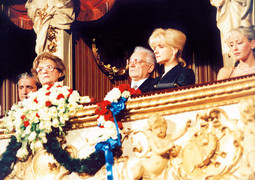 Miroslav, Ankica, Franjo, Nevenka and Snjezana Tudjman in a box of the Croatian National Theatre in Zagreb Recent history, however, to a large degree contradicts Tudjman's positions. Mesic sharply criticised Tudjman's regime because he was personally deeply convinced that his faults needed to be changed. The voters recognised this and gave him their support, which they repeated entrusting him with a second mandate, above all because they were happy with the direction Croatia had taken after its departure from the leadership style of Franjo Tudjman. Miroslav Tudjman cannot forgive Stipe Mesic for laying bare his father's regime by, from time to time, giving the public an insight into the transcripts of Franjo Tudjman's meetings with his closest associates, all of which the late Tudjman recorded.
Miroslav, Ankica, Franjo, Nevenka and Snjezana Tudjman in a box of the Croatian National Theatre in Zagreb Recent history, however, to a large degree contradicts Tudjman's positions. Mesic sharply criticised Tudjman's regime because he was personally deeply convinced that his faults needed to be changed. The voters recognised this and gave him their support, which they repeated entrusting him with a second mandate, above all because they were happy with the direction Croatia had taken after its departure from the leadership style of Franjo Tudjman. Miroslav Tudjman cannot forgive Stipe Mesic for laying bare his father's regime by, from time to time, giving the public an insight into the transcripts of Franjo Tudjman's meetings with his closest associates, all of which the late Tudjman recorded.
In attacking Stipe Mesic for his testimony given before the Hague tribunal, Miroslav Tudjman omits to mention that it was he precisely who in December of 2000 removed possibly the most interesting transcripts of Tudjman's conversations with his associates from the President's Office. Hague tribunal investigators in October of 2001 asked the Croatian authorities to take from Miroslav Tudjman some 40 transcripts he illegally seized. It is assumed that it is precisely these 40 or so transcripts that could serve as precious evidence that a group of former HDZ leaders encouraged, approved and covered up war crimes in Bosnia & Herzegovina. The stolen transcripts of these conversations pertain to Tudjman's discussions with the chiefs of the secret services at the time – Miroslav Separovic, Markica Rebic, Miroslav Tudjman, Ivic Pasalic and Pavao Miljavac – about Tihomil Blaskic, the Dubrovacka bank affair and the bank account of Ankica Tudjman.
The Hague tribunal prosecution was at the time quite certain that material could be found among those transcripts that would help reconstruct the underground political connections between Ivic Pasalic, then advisor to the President, and the Hague indictee Mladen Naletilic, the founder and informal commander of one of the Croatian Defence Council's special units, known in the public as the Convicts' Battalion. The Hague tribunal's prosecutors were probably completely right in assuming that the transcripts, still in the private archives of Miroslav Tudjman, contain details on Tudjman's and Pasalic's political relations with Hague indictees, above all with Naletilic. It was interesting to them at the time not only as possible evidence of Naletilic's political masterminds, but also as a possible source of information on the organisers of the disappearance of Ante Gotovina, who was on the run. That is why they endeavoured to force Croatian Government to implement its own decision on taking over the entire Presidential archive, and make Miroslav Tudjman return the transcripts that did not belong to him. That has not happened to this day.
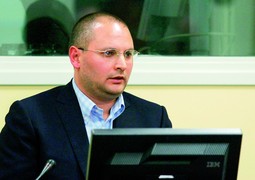 DOMAGOJ MARGETIC supports Miroslav Tudjman in the latest issue of Spremnost At the same time, in the Croatian weekly Spremnost, which bills itself the first and best selling Croatian newspaper in Australia, Domagoj Margetic, a journalist who has together with Markica Rebic already had serious problems with charges of contempt of the Hague tribunal, wrote an article in which he accuses Stipe Mesic of falsifying transcripts from the Office of the President, and of a plot in which a person who wished to testify to that effect before Hague tribunal investigators allegedly died under mysterious circumstances. That article, published in Spremnost, in which Miroslav Tudjman's book is advertised on the cover page, indirectly reveals who supports his political campaign.
DOMAGOJ MARGETIC supports Miroslav Tudjman in the latest issue of Spremnost At the same time, in the Croatian weekly Spremnost, which bills itself the first and best selling Croatian newspaper in Australia, Domagoj Margetic, a journalist who has together with Markica Rebic already had serious problems with charges of contempt of the Hague tribunal, wrote an article in which he accuses Stipe Mesic of falsifying transcripts from the Office of the President, and of a plot in which a person who wished to testify to that effect before Hague tribunal investigators allegedly died under mysterious circumstances. That article, published in Spremnost, in which Miroslav Tudjman's book is advertised on the cover page, indirectly reveals who supports his political campaign.
Miroslav Tudjman and the members of his family would certainly not embark on that kind of political campaign if they were not counting on the support of a part of the HDZ membership. In earlier years it was on several occasions mentioned that the right wing in the HDZ, unofficially led by Andrija Hebrang, was wresting control from Ivo Sanader and preparing his ouster. Today it is an open question who in the HDZ would adhere to Miroslav Tudjman and his movement.
Tudjman's possible coup against Ivo Sanader and his position within the HDZ, it appears, is not fated to success. At the start of the election campaign for parliament in which HDZ does not stand at its best, the heralding of a possible coup by forgotten dissenters and dissatisfied "sleepers" within the HDZ, could cost Sanader and his associates a part of the precious energy they will need in the campaign if they want to stay in government.
Attack on account of the Hague
Miroslav Tudjman and his followers, a part of the HDZ dissenters that have for several years now been pushed to the position of the radical right, are particularly unhappy with the relations of the HDZ and of Ivo Sanader towards the Hague tribunal. A situation in which the HDZ is increasingly seen as one of the two mainstream political options, that does not at all wish to consider a renewal of the former Tudjman regime, also by no means suits them.
Latest news
-
28.10.2010. / 14:15
'A profitable INA is in everyone's interest'
-
28.10.2010. / 09:38
Sanader’s eight fear SDP — Won’t bring down Government
-
21.10.2010. / 15:02
Interior Ministry turned a blind eye on Pukanic assassination
-
20.10.2010. / 09:34
Barisic could bankrupt HDZ



